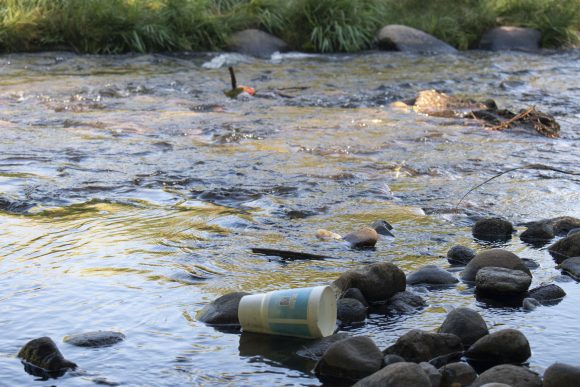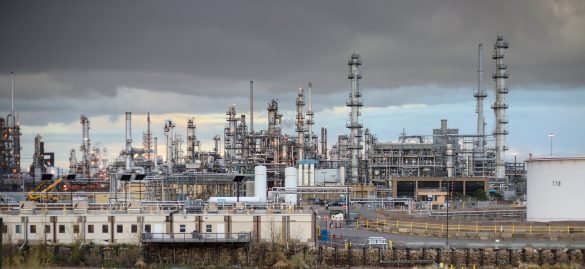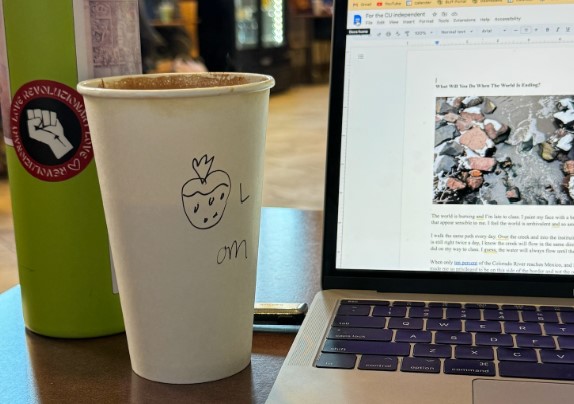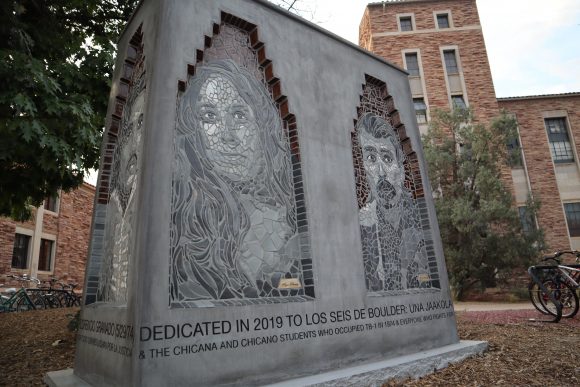
Trash floats in Boulder Creek on Sept. 11, 2022 (Celia Frazier/CU Independent)
The world is burning, and I’m late to class. I paint my face with a bricolage of rationalizations that appear sensible to me. I feel the world is ambivalent, and so am I.
I walk the same path every day: over the creek and into the institution. Like how a broken clock is still right twice a day, I know the creek will flow in the same direction on my way home as it did on my way to class. I guess the water will always flow until the day it does not.
When about only ten percent of the Colorado River reaches Mexico, and I am half Mexican, what made me so privileged to be on this side of the border and not the other? Why is my Peruvian father planting trees in the Rocky Mountains and not in the Andes? The same land that was once my ancestors;’ then, the land of colonizers and finally, the land of different colonizers.
A war was fought, but my people had already lost after the first ship had sailed. Centuries passed, and now I’m the first in my family to attend university. I speak the language of all my colonizers, whether they be French, Spanish or English. Their tongue has been stuffed down my throat, and my head is at the intersection of it all.
As if this moment will bring me resolve, my eyes swallow the water that streams so peacefully. Like my ancestors, I know that this water, which was once snow, is as alive as I am. She had traveled far to see me, and I must say hello.
However, at a certain point, I remember that the Colorado River, which provides water to Arizona, Colorado, Wyoming, Utah, New Mexico, Nevada, California and Mexico, has been in drought since before I was even born. The creek may flow, but her story is one of 24 years of drought.
I have no time to linger, and the creek, try as it may, will never reach the ocean. This water is as impermanent as the catharsis it has brought me.
I am rushing to class now, but my mind is reminiscing on a particular stanza by poet Natalie Diaz in “Post colonial Love Poem:” “The water we drink, like the air we breathe, is not a part of our body but is our body.”
The creek is running low this morning, which means I am running low this morning.
What does it mean to love something that depresses you? It means ordering a latte before class, knowing that “every cup of coffee consumed destroys roughly one square inch of rainforest.” It means drinking a foamy latte while only 25 miles away from you, the residents of Commerce City are drinking contaminated water that may give them kidney cancer, testicular cancer, breast cancer, ovarian cancer, endometrial cancer, prostate cancer, non-Hodgkin lymphoma, thyroid cancer and childhood leukemia. When 48% of Commerce City residents are Latino, but only 22% of Colorado residents are Latino, you need not be a mathematician to see the disproportion. But here I am, drinking a latte – only 26 miles away.


I present these statistics in class, but no matter how articulate I am, I feel no one hears me. Why is no one angry? I feel so stuck.
I can make a documentary about water privatization in Latin America; I can get $5,000 in funding from the university for The Bold to create an entire section dedicated to climate reporting; I can attend local workshops on regenerative farming; I can read Bill McKibben, Rachel Carson or “All We Can Save” as many times as I want; I can become vegan and only eat organic; I can refuse to buy new clothes except shoes (my guilty pleasure); I can commit to flying less; I can drive less and walk everywhere; I can refuse to buy from Amazon; I can do everything I can, and oil will still burn while rivers run low.
So, as I present the human rights violations underway in Commerce City, it occurs to me that I am still not doing everything I can. My frustration with the ecological collapse has been met with a world that seems uninterested in our own demise.
The world is ending, and I have to do my homework. The U.S. is supporting a “military operation in Rafah,” which means we are supporting genocide. I am sitting in class learning about human rights. The University of Colorado Boulder says they have a “clear path to a zero emissions target for all categories by no later than 2050,” but I do not believe the residents of Commerce City should endure another 26 years of pollution, disease and death. The world is ambivalent, and so am I.

The sculpture in front of Temporary Building No. 1. Each mosaic is encircled with a text dedication to the members of Los Seis. Sept. 3, 2019 (Robert Tann/CU Independent)
I am on my way home from class now, and I pass by the memorial of Los Seis. Una Jaakola, Reyes Martinez, Neva Romero, Francisco Dougherty, Heriberto Teran and Florencio Granado all died for my educational opportunity. They were killed off campus while students were occupying Temporary Building No. 1 at CU Boulder, demanding funding for students like myself. I wish I could ask for their guidance.
Climate change and ecological collapse disproportionately affect the marginalized. Half of those living near hazardous waste are people of color. Black Americans are 75% more likely to live near commercial facilities that produce emissions, odor and noise pollution. The world is so hot that farmworkers are dying as they pick the food we eat. Delivery drivers who bring the packages to our doorsteps are dying of heat stroke in Texas. By 2025, over half the world’s population will be living in a water-scarce area.
Climate change is killing my people first, but eventually, it will kill everyone.
I am trying to convey to you the gravitas of our lands, water, air and bodies being murdered — how this crime is so difficult to trace. Who do I call on the day the creek runs dry? What do I eat when all the farmworkers are dead in the fields? Where do I go when this world is too hot? How do I stop the end of the world?
I begin by stopping what I can. CU Boulder has $270 million invested in fossil fuels. CU Boulder has $270 million invested in our own extinction. So, I must ask the Board of Regents: why are you killing us? This is not a matter of “fiscal responsibility.”
Anything apart from an immediate and full divestment from fossil fuels will be understood as an active participation in our extinction.
My fellow students have protested to no avail. Regardless, I will not give up, for I love this world and its people. I don’t want my peers to be fighting in wars over water twenty years from now when we could have fought for divestment today.
I am happy to tell you that the United Mexican American Students y Mecha has offered to host a space for the movement towards divestment. We are hosting a teach-in on environmental action on Thursday, February 22, at 5:30 p.m. in Ekeley Room E1B50. We invite all our peers, professors, staff members and anyone affiliated with CU Boulder to join us. If you cannot attend, the least you can do is sign the petition for divestment and share it with everyone you know. We will not survive if we do not have solidarity.
¡La unión hace la fuerza!
Con Mucho Amor,
Bianca Perez con UMAS y Mecha
Contact Guest Writer Bianca Perez at bianca.perez@colorado.edu.
